An Investigation of Nurses' Role in Cancer Palliative Care in the UK
VerifiedAdded on 2020/10/22
|20
|5143
|161
Case Study
AI Summary
This case study investigates the role and impact of nurses in caring for cancer patients within palliative care settings in the UK, specifically focusing on Marie Curie Cancer Care. The research employs a qualitative approach, using questionnaires administered to 50 nurses to gather primary data. The study aims to analyze the nurses' roles, assess the influence of nursing interventions, and determine the palliative care approaches used. Key findings highlight the need for effective palliative care and the importance of nurses' understanding of patient needs. The research concludes that nurses must be adequately trained and supported to improve health outcomes for cancer patients. The methodology includes an exploratory design with thematic analysis, and the findings emphasize the significance of palliative care in improving the quality of life for cancer patients. The study also explores nursing interventions, ethical considerations, and literature search strategies to provide a comprehensive understanding of the subject.
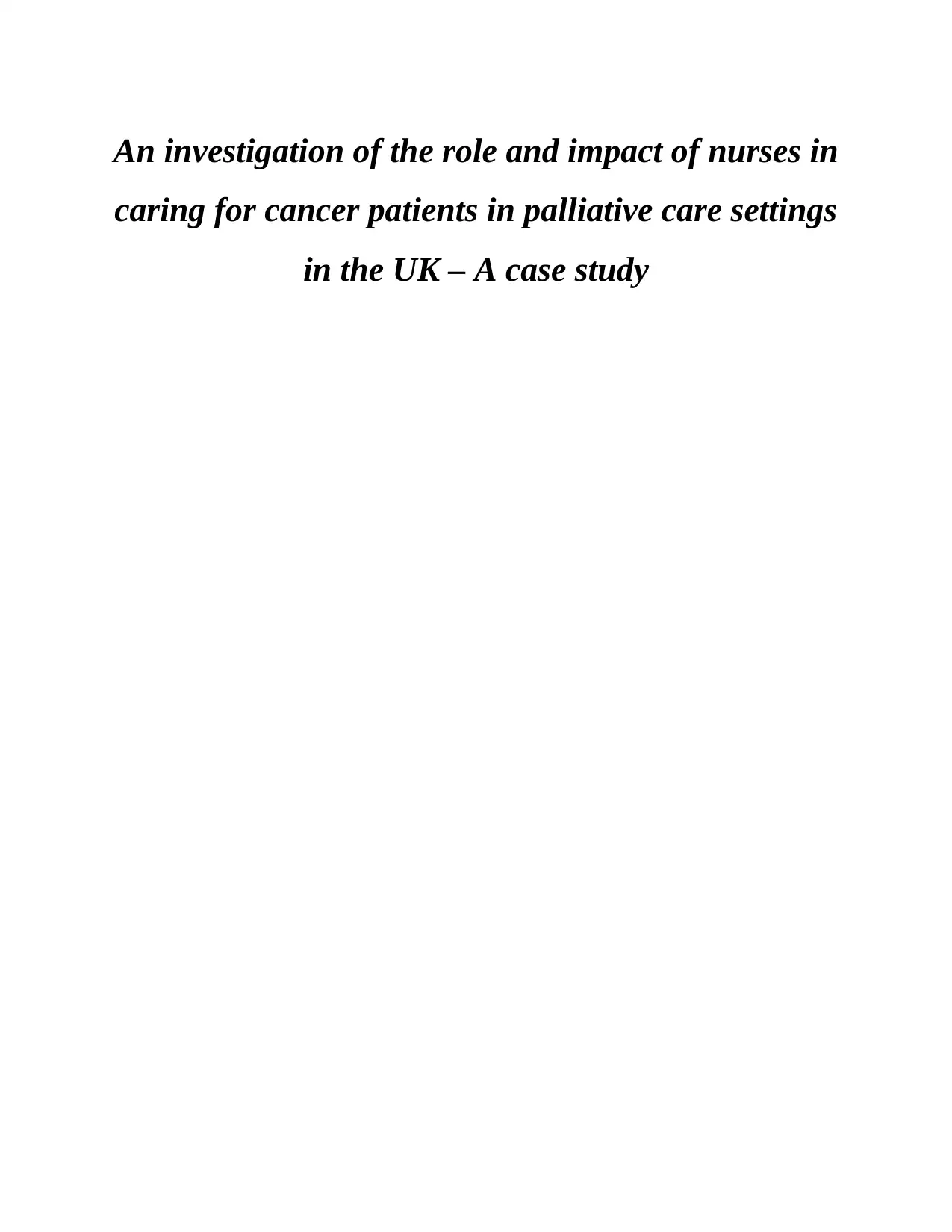
An investigation of the role and impact of nurses in
caring for cancer patients in palliative care settings
in the UK – A case study
caring for cancer patients in palliative care settings
in the UK – A case study
Paraphrase This Document
Need a fresh take? Get an instant paraphrase of this document with our AI Paraphraser
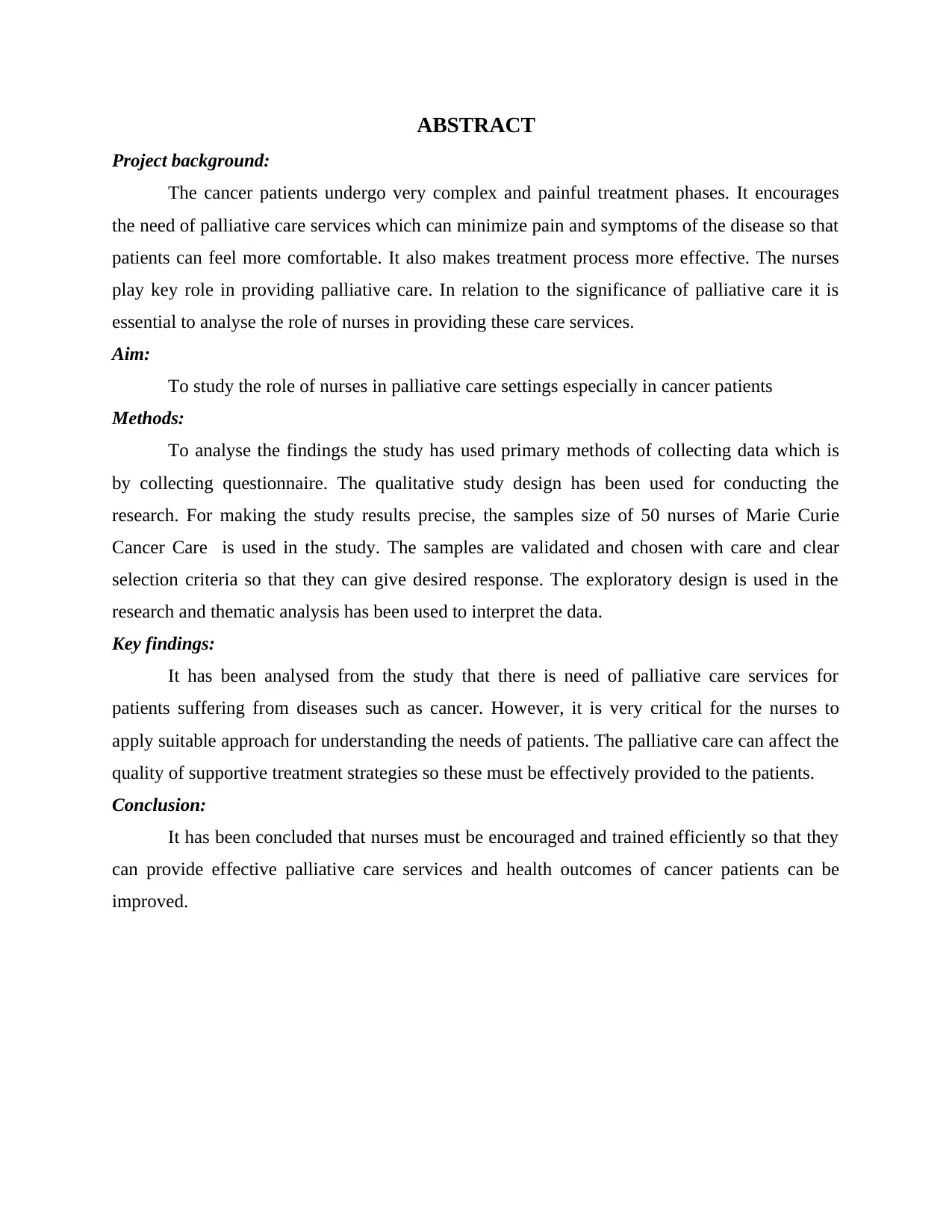
ABSTRACT
Project background:
The cancer patients undergo very complex and painful treatment phases. It encourages
the need of palliative care services which can minimize pain and symptoms of the disease so that
patients can feel more comfortable. It also makes treatment process more effective. The nurses
play key role in providing palliative care. In relation to the significance of palliative care it is
essential to analyse the role of nurses in providing these care services.
Aim:
To study the role of nurses in palliative care settings especially in cancer patients
Methods:
To analyse the findings the study has used primary methods of collecting data which is
by collecting questionnaire. The qualitative study design has been used for conducting the
research. For making the study results precise, the samples size of 50 nurses of Marie Curie
Cancer Care is used in the study. The samples are validated and chosen with care and clear
selection criteria so that they can give desired response. The exploratory design is used in the
research and thematic analysis has been used to interpret the data.
Key findings:
It has been analysed from the study that there is need of palliative care services for
patients suffering from diseases such as cancer. However, it is very critical for the nurses to
apply suitable approach for understanding the needs of patients. The palliative care can affect the
quality of supportive treatment strategies so these must be effectively provided to the patients.
Conclusion:
It has been concluded that nurses must be encouraged and trained efficiently so that they
can provide effective palliative care services and health outcomes of cancer patients can be
improved.
Project background:
The cancer patients undergo very complex and painful treatment phases. It encourages
the need of palliative care services which can minimize pain and symptoms of the disease so that
patients can feel more comfortable. It also makes treatment process more effective. The nurses
play key role in providing palliative care. In relation to the significance of palliative care it is
essential to analyse the role of nurses in providing these care services.
Aim:
To study the role of nurses in palliative care settings especially in cancer patients
Methods:
To analyse the findings the study has used primary methods of collecting data which is
by collecting questionnaire. The qualitative study design has been used for conducting the
research. For making the study results precise, the samples size of 50 nurses of Marie Curie
Cancer Care is used in the study. The samples are validated and chosen with care and clear
selection criteria so that they can give desired response. The exploratory design is used in the
research and thematic analysis has been used to interpret the data.
Key findings:
It has been analysed from the study that there is need of palliative care services for
patients suffering from diseases such as cancer. However, it is very critical for the nurses to
apply suitable approach for understanding the needs of patients. The palliative care can affect the
quality of supportive treatment strategies so these must be effectively provided to the patients.
Conclusion:
It has been concluded that nurses must be encouraged and trained efficiently so that they
can provide effective palliative care services and health outcomes of cancer patients can be
improved.
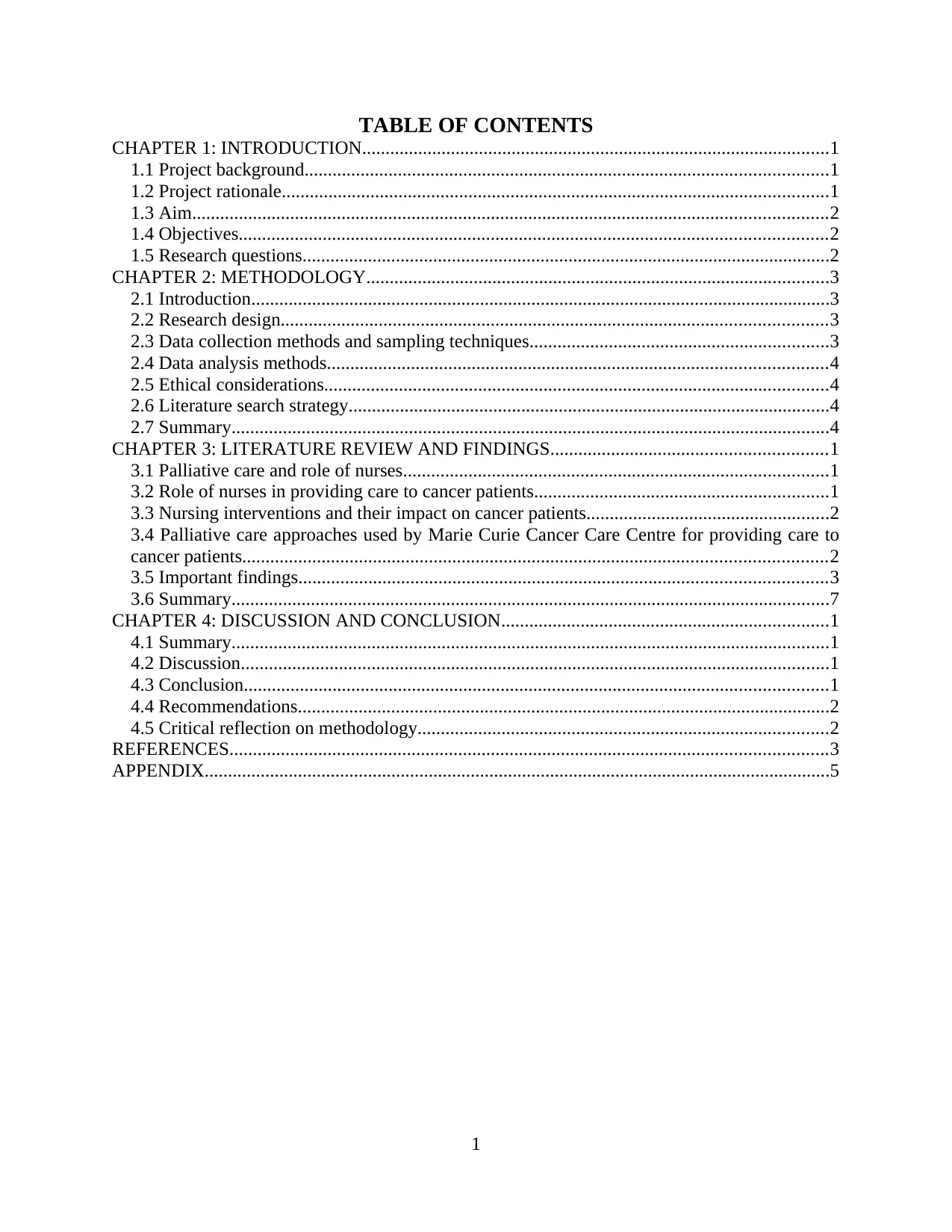
TABLE OF CONTENTS
CHAPTER 1: INTRODUCTION....................................................................................................1
1.1 Project background................................................................................................................1
1.2 Project rationale.....................................................................................................................1
1.3 Aim........................................................................................................................................2
1.4 Objectives..............................................................................................................................2
1.5 Research questions.................................................................................................................2
CHAPTER 2: METHODOLOGY...................................................................................................3
2.1 Introduction............................................................................................................................3
2.2 Research design.....................................................................................................................3
2.3 Data collection methods and sampling techniques................................................................3
2.4 Data analysis methods...........................................................................................................4
2.5 Ethical considerations............................................................................................................4
2.6 Literature search strategy.......................................................................................................4
2.7 Summary................................................................................................................................4
CHAPTER 3: LITERATURE REVIEW AND FINDINGS...........................................................1
3.1 Palliative care and role of nurses...........................................................................................1
3.2 Role of nurses in providing care to cancer patients...............................................................1
3.3 Nursing interventions and their impact on cancer patients....................................................2
3.4 Palliative care approaches used by Marie Curie Cancer Care Centre for providing care to
cancer patients.............................................................................................................................2
3.5 Important findings.................................................................................................................3
3.6 Summary................................................................................................................................7
CHAPTER 4: DISCUSSION AND CONCLUSION......................................................................1
4.1 Summary................................................................................................................................1
4.2 Discussion..............................................................................................................................1
4.3 Conclusion.............................................................................................................................1
4.4 Recommendations..................................................................................................................2
4.5 Critical reflection on methodology........................................................................................2
REFERENCES................................................................................................................................3
APPENDIX......................................................................................................................................5
1
CHAPTER 1: INTRODUCTION....................................................................................................1
1.1 Project background................................................................................................................1
1.2 Project rationale.....................................................................................................................1
1.3 Aim........................................................................................................................................2
1.4 Objectives..............................................................................................................................2
1.5 Research questions.................................................................................................................2
CHAPTER 2: METHODOLOGY...................................................................................................3
2.1 Introduction............................................................................................................................3
2.2 Research design.....................................................................................................................3
2.3 Data collection methods and sampling techniques................................................................3
2.4 Data analysis methods...........................................................................................................4
2.5 Ethical considerations............................................................................................................4
2.6 Literature search strategy.......................................................................................................4
2.7 Summary................................................................................................................................4
CHAPTER 3: LITERATURE REVIEW AND FINDINGS...........................................................1
3.1 Palliative care and role of nurses...........................................................................................1
3.2 Role of nurses in providing care to cancer patients...............................................................1
3.3 Nursing interventions and their impact on cancer patients....................................................2
3.4 Palliative care approaches used by Marie Curie Cancer Care Centre for providing care to
cancer patients.............................................................................................................................2
3.5 Important findings.................................................................................................................3
3.6 Summary................................................................................................................................7
CHAPTER 4: DISCUSSION AND CONCLUSION......................................................................1
4.1 Summary................................................................................................................................1
4.2 Discussion..............................................................................................................................1
4.3 Conclusion.............................................................................................................................1
4.4 Recommendations..................................................................................................................2
4.5 Critical reflection on methodology........................................................................................2
REFERENCES................................................................................................................................3
APPENDIX......................................................................................................................................5
1
⊘ This is a preview!⊘
Do you want full access?
Subscribe today to unlock all pages.

Trusted by 1+ million students worldwide

CHAPTER 1: INTRODUCTION
1.1 Project background
Palliative care aims at preventing and providing comfort to the people going through the
life threatening diseases such as cancer. Along with the physical pain, these services also manage
spiritual and psychological problems of the people. The cancer patients especially the ones who
have limited time period for the survival can get relief at some extent by these services. The care
providing nurses are significant in recognising suitable method or approach of palliative care
(Rodin and et.al., 2015). The study will evaluate the role nurses in providing these services
through a case study.
The treatment process of cancer is very painful and can cause great damage to the moral
and strength of the patient thus in such situation it becomes essential to analyse the role of nurses
who provide care and support to the cancer survivals. This research is also focused on the
necessary skills required by the nurses so that they can effectively engage in palliative services.
The painful condition of the cancer patients can be difficult for the nurses to witness because an
emotional bond is established between them and patient.
Hence, it becomes necessary that nurses must remain stable so that they can understand
the needs of patient without showing inefficiency in their job role. The palliative care improves
the quality of life of cancer patients thus it is required that various aspects of this approach must
be analysed. The better nursing interventions can be developed by evaluation of the role of
nurses (Cherry and Jacob, 2016). Along with the palliative care there are several nursing
interventions which can be helpful in providing comfort and treatment to cancer patients.
However, if nurses are not aware of their role then they may not fully understand the
needs of their patients and thus the nursing interventions may not prove to be highly effective.
Palliative care methods may vary depending upon the support needed by the patient. It is the
responsibility of the nurses to identify the needs of patients and to suggest suitable palliative
care.
1.2 Project rationale
The key reason for choosing the role of nurses in palliative care is to analyse its
significance in improving the condition and care methodologies for cancer patients. The disease
itself is a wide subject of interest of many health professionals and researchers. Along with the
2
1.1 Project background
Palliative care aims at preventing and providing comfort to the people going through the
life threatening diseases such as cancer. Along with the physical pain, these services also manage
spiritual and psychological problems of the people. The cancer patients especially the ones who
have limited time period for the survival can get relief at some extent by these services. The care
providing nurses are significant in recognising suitable method or approach of palliative care
(Rodin and et.al., 2015). The study will evaluate the role nurses in providing these services
through a case study.
The treatment process of cancer is very painful and can cause great damage to the moral
and strength of the patient thus in such situation it becomes essential to analyse the role of nurses
who provide care and support to the cancer survivals. This research is also focused on the
necessary skills required by the nurses so that they can effectively engage in palliative services.
The painful condition of the cancer patients can be difficult for the nurses to witness because an
emotional bond is established between them and patient.
Hence, it becomes necessary that nurses must remain stable so that they can understand
the needs of patient without showing inefficiency in their job role. The palliative care improves
the quality of life of cancer patients thus it is required that various aspects of this approach must
be analysed. The better nursing interventions can be developed by evaluation of the role of
nurses (Cherry and Jacob, 2016). Along with the palliative care there are several nursing
interventions which can be helpful in providing comfort and treatment to cancer patients.
However, if nurses are not aware of their role then they may not fully understand the
needs of their patients and thus the nursing interventions may not prove to be highly effective.
Palliative care methods may vary depending upon the support needed by the patient. It is the
responsibility of the nurses to identify the needs of patients and to suggest suitable palliative
care.
1.2 Project rationale
The key reason for choosing the role of nurses in palliative care is to analyse its
significance in improving the condition and care methodologies for cancer patients. The disease
itself is a wide subject of interest of many health professionals and researchers. Along with the
2
Paraphrase This Document
Need a fresh take? Get an instant paraphrase of this document with our AI Paraphraser
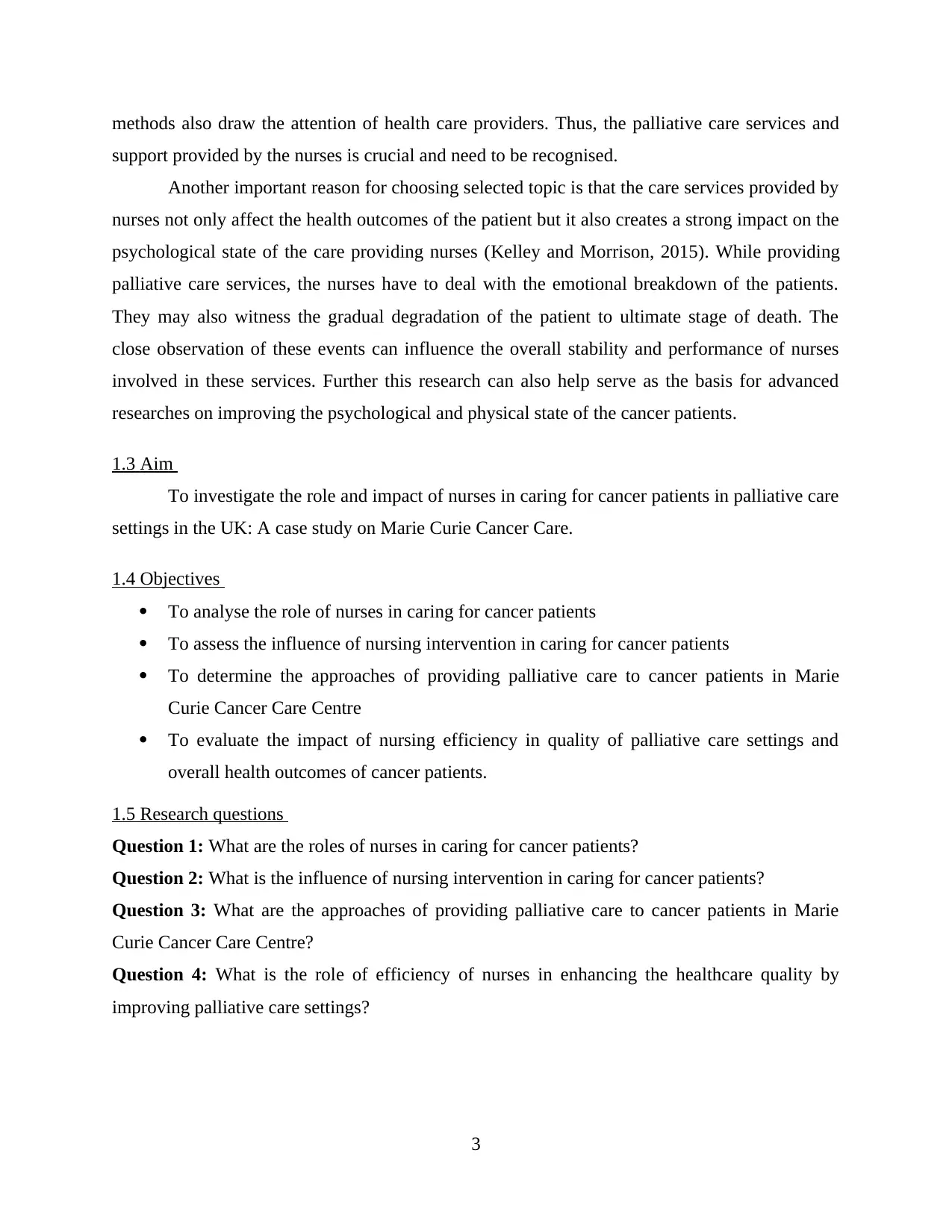
methods also draw the attention of health care providers. Thus, the palliative care services and
support provided by the nurses is crucial and need to be recognised.
Another important reason for choosing selected topic is that the care services provided by
nurses not only affect the health outcomes of the patient but it also creates a strong impact on the
psychological state of the care providing nurses (Kelley and Morrison, 2015). While providing
palliative care services, the nurses have to deal with the emotional breakdown of the patients.
They may also witness the gradual degradation of the patient to ultimate stage of death. The
close observation of these events can influence the overall stability and performance of nurses
involved in these services. Further this research can also help serve as the basis for advanced
researches on improving the psychological and physical state of the cancer patients.
1.3 Aim
To investigate the role and impact of nurses in caring for cancer patients in palliative care
settings in the UK: A case study on Marie Curie Cancer Care.
1.4 Objectives
To analyse the role of nurses in caring for cancer patients
To assess the influence of nursing intervention in caring for cancer patients
To determine the approaches of providing palliative care to cancer patients in Marie
Curie Cancer Care Centre
To evaluate the impact of nursing efficiency in quality of palliative care settings and
overall health outcomes of cancer patients.
1.5 Research questions
Question 1: What are the roles of nurses in caring for cancer patients?
Question 2: What is the influence of nursing intervention in caring for cancer patients?
Question 3: What are the approaches of providing palliative care to cancer patients in Marie
Curie Cancer Care Centre?
Question 4: What is the role of efficiency of nurses in enhancing the healthcare quality by
improving palliative care settings?
3
support provided by the nurses is crucial and need to be recognised.
Another important reason for choosing selected topic is that the care services provided by
nurses not only affect the health outcomes of the patient but it also creates a strong impact on the
psychological state of the care providing nurses (Kelley and Morrison, 2015). While providing
palliative care services, the nurses have to deal with the emotional breakdown of the patients.
They may also witness the gradual degradation of the patient to ultimate stage of death. The
close observation of these events can influence the overall stability and performance of nurses
involved in these services. Further this research can also help serve as the basis for advanced
researches on improving the psychological and physical state of the cancer patients.
1.3 Aim
To investigate the role and impact of nurses in caring for cancer patients in palliative care
settings in the UK: A case study on Marie Curie Cancer Care.
1.4 Objectives
To analyse the role of nurses in caring for cancer patients
To assess the influence of nursing intervention in caring for cancer patients
To determine the approaches of providing palliative care to cancer patients in Marie
Curie Cancer Care Centre
To evaluate the impact of nursing efficiency in quality of palliative care settings and
overall health outcomes of cancer patients.
1.5 Research questions
Question 1: What are the roles of nurses in caring for cancer patients?
Question 2: What is the influence of nursing intervention in caring for cancer patients?
Question 3: What are the approaches of providing palliative care to cancer patients in Marie
Curie Cancer Care Centre?
Question 4: What is the role of efficiency of nurses in enhancing the healthcare quality by
improving palliative care settings?
3
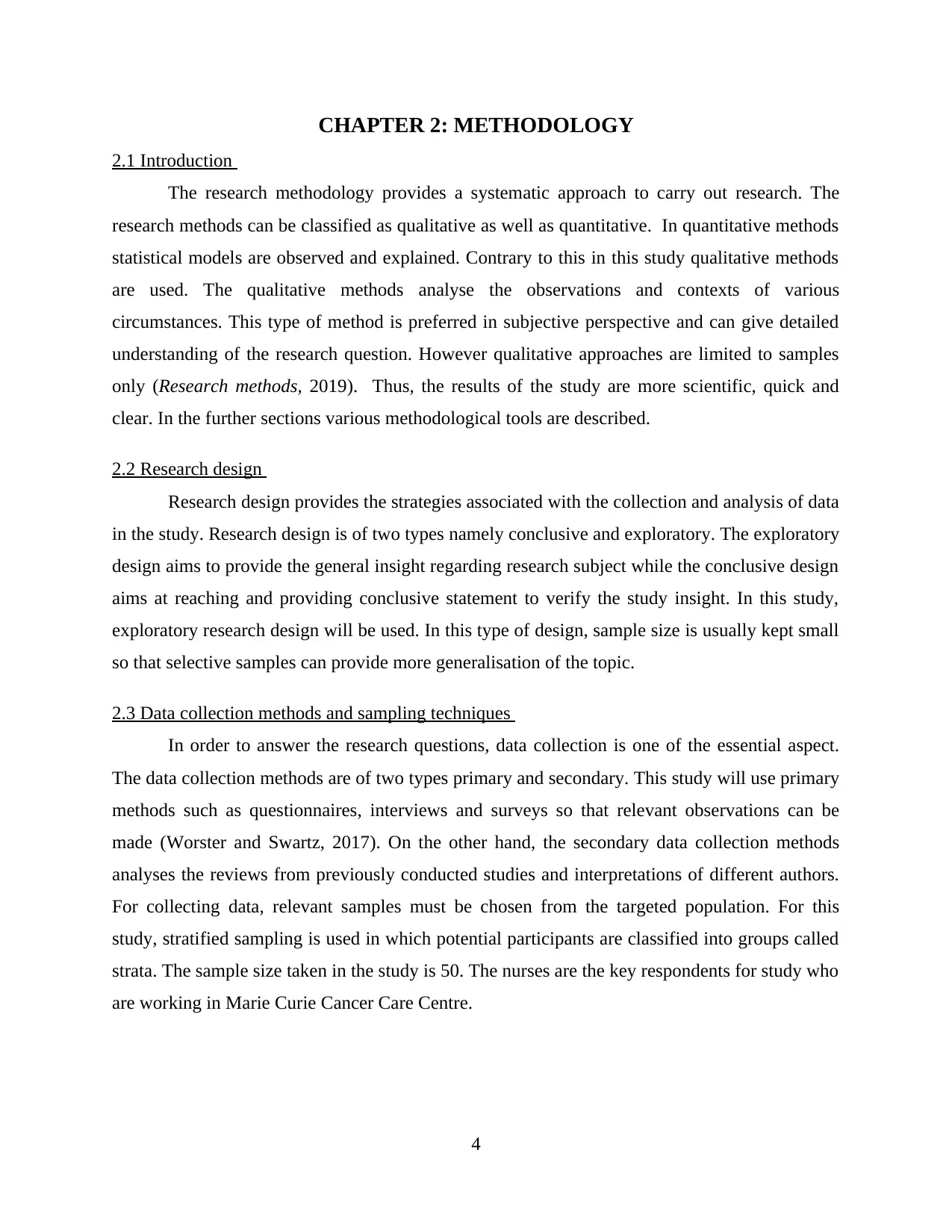
CHAPTER 2: METHODOLOGY
2.1 Introduction
The research methodology provides a systematic approach to carry out research. The
research methods can be classified as qualitative as well as quantitative. In quantitative methods
statistical models are observed and explained. Contrary to this in this study qualitative methods
are used. The qualitative methods analyse the observations and contexts of various
circumstances. This type of method is preferred in subjective perspective and can give detailed
understanding of the research question. However qualitative approaches are limited to samples
only (Research methods, 2019). Thus, the results of the study are more scientific, quick and
clear. In the further sections various methodological tools are described.
2.2 Research design
Research design provides the strategies associated with the collection and analysis of data
in the study. Research design is of two types namely conclusive and exploratory. The exploratory
design aims to provide the general insight regarding research subject while the conclusive design
aims at reaching and providing conclusive statement to verify the study insight. In this study,
exploratory research design will be used. In this type of design, sample size is usually kept small
so that selective samples can provide more generalisation of the topic.
2.3 Data collection methods and sampling techniques
In order to answer the research questions, data collection is one of the essential aspect.
The data collection methods are of two types primary and secondary. This study will use primary
methods such as questionnaires, interviews and surveys so that relevant observations can be
made (Worster and Swartz, 2017). On the other hand, the secondary data collection methods
analyses the reviews from previously conducted studies and interpretations of different authors.
For collecting data, relevant samples must be chosen from the targeted population. For this
study, stratified sampling is used in which potential participants are classified into groups called
strata. The sample size taken in the study is 50. The nurses are the key respondents for study who
are working in Marie Curie Cancer Care Centre.
4
2.1 Introduction
The research methodology provides a systematic approach to carry out research. The
research methods can be classified as qualitative as well as quantitative. In quantitative methods
statistical models are observed and explained. Contrary to this in this study qualitative methods
are used. The qualitative methods analyse the observations and contexts of various
circumstances. This type of method is preferred in subjective perspective and can give detailed
understanding of the research question. However qualitative approaches are limited to samples
only (Research methods, 2019). Thus, the results of the study are more scientific, quick and
clear. In the further sections various methodological tools are described.
2.2 Research design
Research design provides the strategies associated with the collection and analysis of data
in the study. Research design is of two types namely conclusive and exploratory. The exploratory
design aims to provide the general insight regarding research subject while the conclusive design
aims at reaching and providing conclusive statement to verify the study insight. In this study,
exploratory research design will be used. In this type of design, sample size is usually kept small
so that selective samples can provide more generalisation of the topic.
2.3 Data collection methods and sampling techniques
In order to answer the research questions, data collection is one of the essential aspect.
The data collection methods are of two types primary and secondary. This study will use primary
methods such as questionnaires, interviews and surveys so that relevant observations can be
made (Worster and Swartz, 2017). On the other hand, the secondary data collection methods
analyses the reviews from previously conducted studies and interpretations of different authors.
For collecting data, relevant samples must be chosen from the targeted population. For this
study, stratified sampling is used in which potential participants are classified into groups called
strata. The sample size taken in the study is 50. The nurses are the key respondents for study who
are working in Marie Curie Cancer Care Centre.
4
⊘ This is a preview!⊘
Do you want full access?
Subscribe today to unlock all pages.

Trusted by 1+ million students worldwide
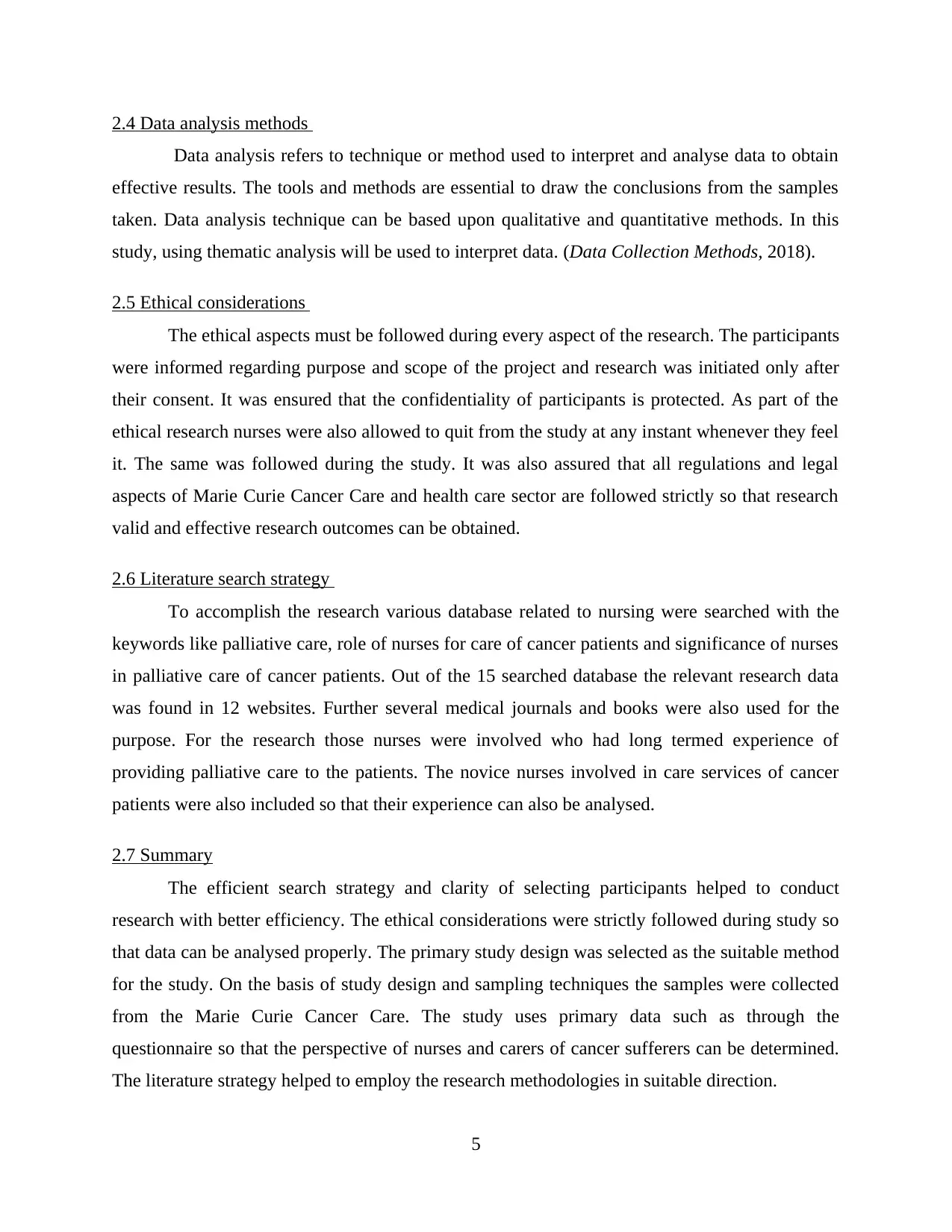
2.4 Data analysis methods
Data analysis refers to technique or method used to interpret and analyse data to obtain
effective results. The tools and methods are essential to draw the conclusions from the samples
taken. Data analysis technique can be based upon qualitative and quantitative methods. In this
study, using thematic analysis will be used to interpret data. (Data Collection Methods, 2018).
2.5 Ethical considerations
The ethical aspects must be followed during every aspect of the research. The participants
were informed regarding purpose and scope of the project and research was initiated only after
their consent. It was ensured that the confidentiality of participants is protected. As part of the
ethical research nurses were also allowed to quit from the study at any instant whenever they feel
it. The same was followed during the study. It was also assured that all regulations and legal
aspects of Marie Curie Cancer Care and health care sector are followed strictly so that research
valid and effective research outcomes can be obtained.
2.6 Literature search strategy
To accomplish the research various database related to nursing were searched with the
keywords like palliative care, role of nurses for care of cancer patients and significance of nurses
in palliative care of cancer patients. Out of the 15 searched database the relevant research data
was found in 12 websites. Further several medical journals and books were also used for the
purpose. For the research those nurses were involved who had long termed experience of
providing palliative care to the patients. The novice nurses involved in care services of cancer
patients were also included so that their experience can also be analysed.
2.7 Summary
The efficient search strategy and clarity of selecting participants helped to conduct
research with better efficiency. The ethical considerations were strictly followed during study so
that data can be analysed properly. The primary study design was selected as the suitable method
for the study. On the basis of study design and sampling techniques the samples were collected
from the Marie Curie Cancer Care. The study uses primary data such as through the
questionnaire so that the perspective of nurses and carers of cancer sufferers can be determined.
The literature strategy helped to employ the research methodologies in suitable direction.
5
Data analysis refers to technique or method used to interpret and analyse data to obtain
effective results. The tools and methods are essential to draw the conclusions from the samples
taken. Data analysis technique can be based upon qualitative and quantitative methods. In this
study, using thematic analysis will be used to interpret data. (Data Collection Methods, 2018).
2.5 Ethical considerations
The ethical aspects must be followed during every aspect of the research. The participants
were informed regarding purpose and scope of the project and research was initiated only after
their consent. It was ensured that the confidentiality of participants is protected. As part of the
ethical research nurses were also allowed to quit from the study at any instant whenever they feel
it. The same was followed during the study. It was also assured that all regulations and legal
aspects of Marie Curie Cancer Care and health care sector are followed strictly so that research
valid and effective research outcomes can be obtained.
2.6 Literature search strategy
To accomplish the research various database related to nursing were searched with the
keywords like palliative care, role of nurses for care of cancer patients and significance of nurses
in palliative care of cancer patients. Out of the 15 searched database the relevant research data
was found in 12 websites. Further several medical journals and books were also used for the
purpose. For the research those nurses were involved who had long termed experience of
providing palliative care to the patients. The novice nurses involved in care services of cancer
patients were also included so that their experience can also be analysed.
2.7 Summary
The efficient search strategy and clarity of selecting participants helped to conduct
research with better efficiency. The ethical considerations were strictly followed during study so
that data can be analysed properly. The primary study design was selected as the suitable method
for the study. On the basis of study design and sampling techniques the samples were collected
from the Marie Curie Cancer Care. The study uses primary data such as through the
questionnaire so that the perspective of nurses and carers of cancer sufferers can be determined.
The literature strategy helped to employ the research methodologies in suitable direction.
5
Paraphrase This Document
Need a fresh take? Get an instant paraphrase of this document with our AI Paraphraser
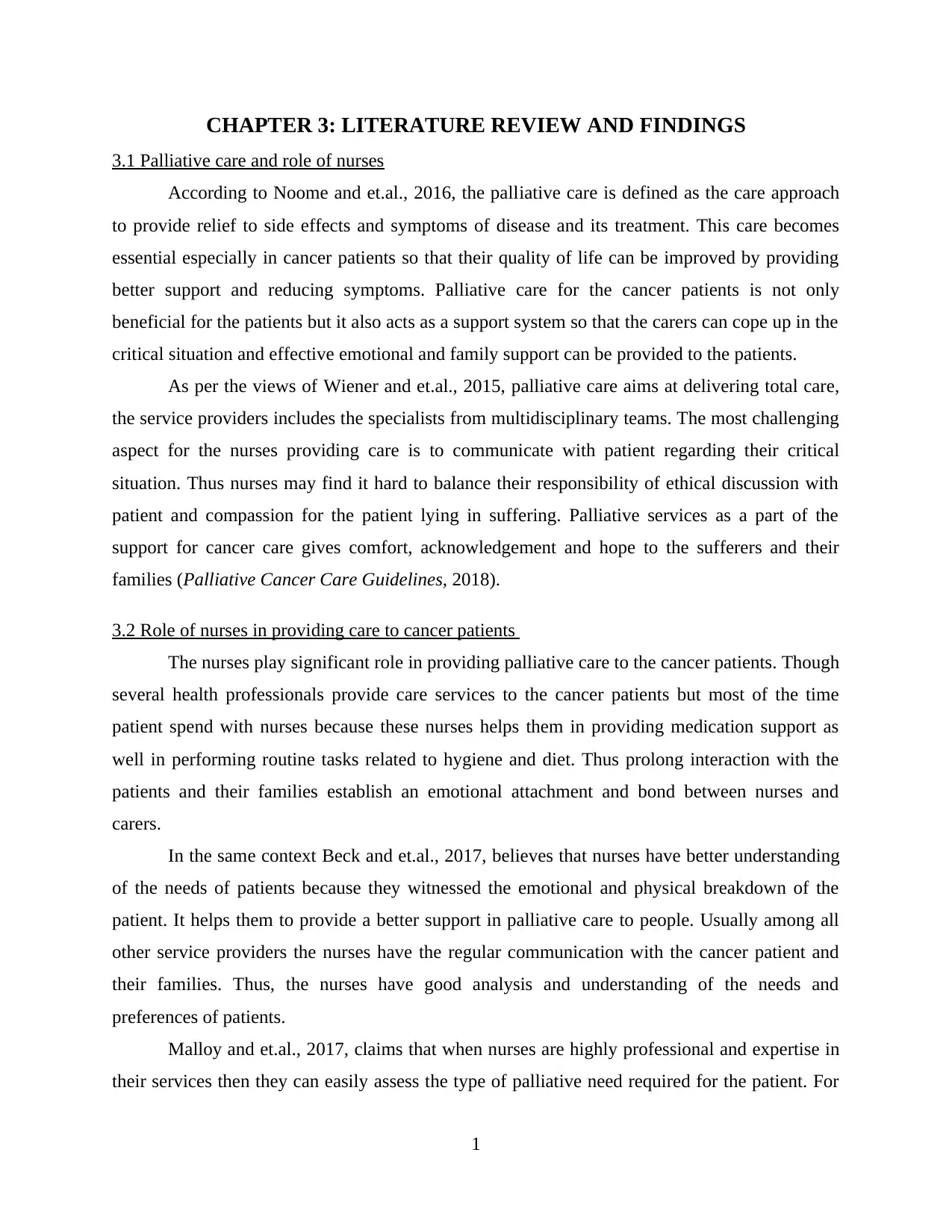
CHAPTER 3: LITERATURE REVIEW AND FINDINGS
3.1 Palliative care and role of nurses
According to Noome and et.al., 2016, the palliative care is defined as the care approach
to provide relief to side effects and symptoms of disease and its treatment. This care becomes
essential especially in cancer patients so that their quality of life can be improved by providing
better support and reducing symptoms. Palliative care for the cancer patients is not only
beneficial for the patients but it also acts as a support system so that the carers can cope up in the
critical situation and effective emotional and family support can be provided to the patients.
As per the views of Wiener and et.al., 2015, palliative care aims at delivering total care,
the service providers includes the specialists from multidisciplinary teams. The most challenging
aspect for the nurses providing care is to communicate with patient regarding their critical
situation. Thus nurses may find it hard to balance their responsibility of ethical discussion with
patient and compassion for the patient lying in suffering. Palliative services as a part of the
support for cancer care gives comfort, acknowledgement and hope to the sufferers and their
families (Palliative Cancer Care Guidelines, 2018).
3.2 Role of nurses in providing care to cancer patients
The nurses play significant role in providing palliative care to the cancer patients. Though
several health professionals provide care services to the cancer patients but most of the time
patient spend with nurses because these nurses helps them in providing medication support as
well in performing routine tasks related to hygiene and diet. Thus prolong interaction with the
patients and their families establish an emotional attachment and bond between nurses and
carers.
In the same context Beck and et.al., 2017, believes that nurses have better understanding
of the needs of patients because they witnessed the emotional and physical breakdown of the
patient. It helps them to provide a better support in palliative care to people. Usually among all
other service providers the nurses have the regular communication with the cancer patient and
their families. Thus, the nurses have good analysis and understanding of the needs and
preferences of patients.
Malloy and et.al., 2017, claims that when nurses are highly professional and expertise in
their services then they can easily assess the type of palliative need required for the patient. For
1
3.1 Palliative care and role of nurses
According to Noome and et.al., 2016, the palliative care is defined as the care approach
to provide relief to side effects and symptoms of disease and its treatment. This care becomes
essential especially in cancer patients so that their quality of life can be improved by providing
better support and reducing symptoms. Palliative care for the cancer patients is not only
beneficial for the patients but it also acts as a support system so that the carers can cope up in the
critical situation and effective emotional and family support can be provided to the patients.
As per the views of Wiener and et.al., 2015, palliative care aims at delivering total care,
the service providers includes the specialists from multidisciplinary teams. The most challenging
aspect for the nurses providing care is to communicate with patient regarding their critical
situation. Thus nurses may find it hard to balance their responsibility of ethical discussion with
patient and compassion for the patient lying in suffering. Palliative services as a part of the
support for cancer care gives comfort, acknowledgement and hope to the sufferers and their
families (Palliative Cancer Care Guidelines, 2018).
3.2 Role of nurses in providing care to cancer patients
The nurses play significant role in providing palliative care to the cancer patients. Though
several health professionals provide care services to the cancer patients but most of the time
patient spend with nurses because these nurses helps them in providing medication support as
well in performing routine tasks related to hygiene and diet. Thus prolong interaction with the
patients and their families establish an emotional attachment and bond between nurses and
carers.
In the same context Beck and et.al., 2017, believes that nurses have better understanding
of the needs of patients because they witnessed the emotional and physical breakdown of the
patient. It helps them to provide a better support in palliative care to people. Usually among all
other service providers the nurses have the regular communication with the cancer patient and
their families. Thus, the nurses have good analysis and understanding of the needs and
preferences of patients.
Malloy and et.al., 2017, claims that when nurses are highly professional and expertise in
their services then they can easily assess the type of palliative need required for the patient. For
1
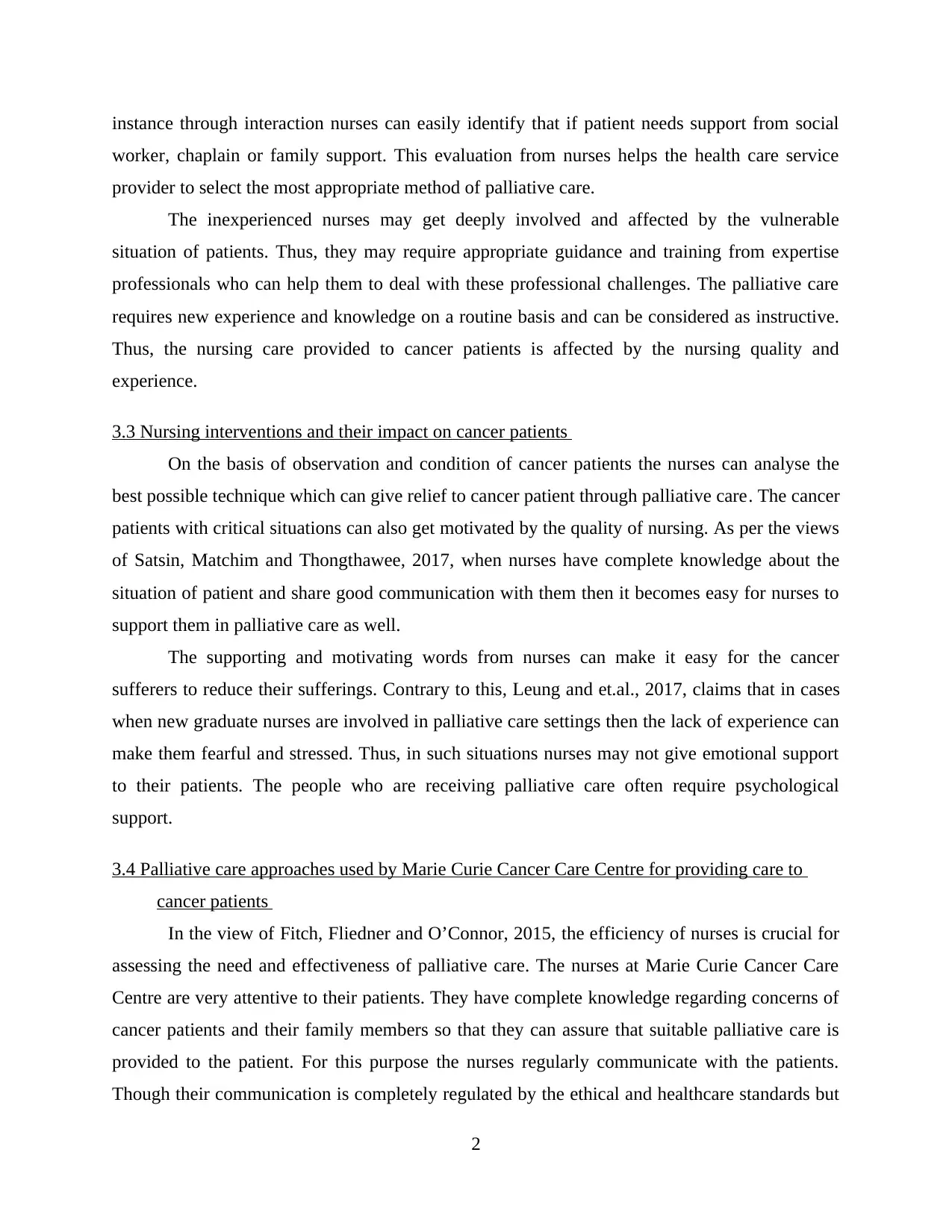
instance through interaction nurses can easily identify that if patient needs support from social
worker, chaplain or family support. This evaluation from nurses helps the health care service
provider to select the most appropriate method of palliative care.
The inexperienced nurses may get deeply involved and affected by the vulnerable
situation of patients. Thus, they may require appropriate guidance and training from expertise
professionals who can help them to deal with these professional challenges. The palliative care
requires new experience and knowledge on a routine basis and can be considered as instructive.
Thus, the nursing care provided to cancer patients is affected by the nursing quality and
experience.
3.3 Nursing interventions and their impact on cancer patients
On the basis of observation and condition of cancer patients the nurses can analyse the
best possible technique which can give relief to cancer patient through palliative care. The cancer
patients with critical situations can also get motivated by the quality of nursing. As per the views
of Satsin, Matchim and Thongthawee, 2017, when nurses have complete knowledge about the
situation of patient and share good communication with them then it becomes easy for nurses to
support them in palliative care as well.
The supporting and motivating words from nurses can make it easy for the cancer
sufferers to reduce their sufferings. Contrary to this, Leung and et.al., 2017, claims that in cases
when new graduate nurses are involved in palliative care settings then the lack of experience can
make them fearful and stressed. Thus, in such situations nurses may not give emotional support
to their patients. The people who are receiving palliative care often require psychological
support.
3.4 Palliative care approaches used by Marie Curie Cancer Care Centre for providing care to
cancer patients
In the view of Fitch, Fliedner and O’Connor, 2015, the efficiency of nurses is crucial for
assessing the need and effectiveness of palliative care. The nurses at Marie Curie Cancer Care
Centre are very attentive to their patients. They have complete knowledge regarding concerns of
cancer patients and their family members so that they can assure that suitable palliative care is
provided to the patient. For this purpose the nurses regularly communicate with the patients.
Though their communication is completely regulated by the ethical and healthcare standards but
2
worker, chaplain or family support. This evaluation from nurses helps the health care service
provider to select the most appropriate method of palliative care.
The inexperienced nurses may get deeply involved and affected by the vulnerable
situation of patients. Thus, they may require appropriate guidance and training from expertise
professionals who can help them to deal with these professional challenges. The palliative care
requires new experience and knowledge on a routine basis and can be considered as instructive.
Thus, the nursing care provided to cancer patients is affected by the nursing quality and
experience.
3.3 Nursing interventions and their impact on cancer patients
On the basis of observation and condition of cancer patients the nurses can analyse the
best possible technique which can give relief to cancer patient through palliative care. The cancer
patients with critical situations can also get motivated by the quality of nursing. As per the views
of Satsin, Matchim and Thongthawee, 2017, when nurses have complete knowledge about the
situation of patient and share good communication with them then it becomes easy for nurses to
support them in palliative care as well.
The supporting and motivating words from nurses can make it easy for the cancer
sufferers to reduce their sufferings. Contrary to this, Leung and et.al., 2017, claims that in cases
when new graduate nurses are involved in palliative care settings then the lack of experience can
make them fearful and stressed. Thus, in such situations nurses may not give emotional support
to their patients. The people who are receiving palliative care often require psychological
support.
3.4 Palliative care approaches used by Marie Curie Cancer Care Centre for providing care to
cancer patients
In the view of Fitch, Fliedner and O’Connor, 2015, the efficiency of nurses is crucial for
assessing the need and effectiveness of palliative care. The nurses at Marie Curie Cancer Care
Centre are very attentive to their patients. They have complete knowledge regarding concerns of
cancer patients and their family members so that they can assure that suitable palliative care is
provided to the patient. For this purpose the nurses regularly communicate with the patients.
Though their communication is completely regulated by the ethical and healthcare standards but
2
⊘ This is a preview!⊘
Do you want full access?
Subscribe today to unlock all pages.

Trusted by 1+ million students worldwide
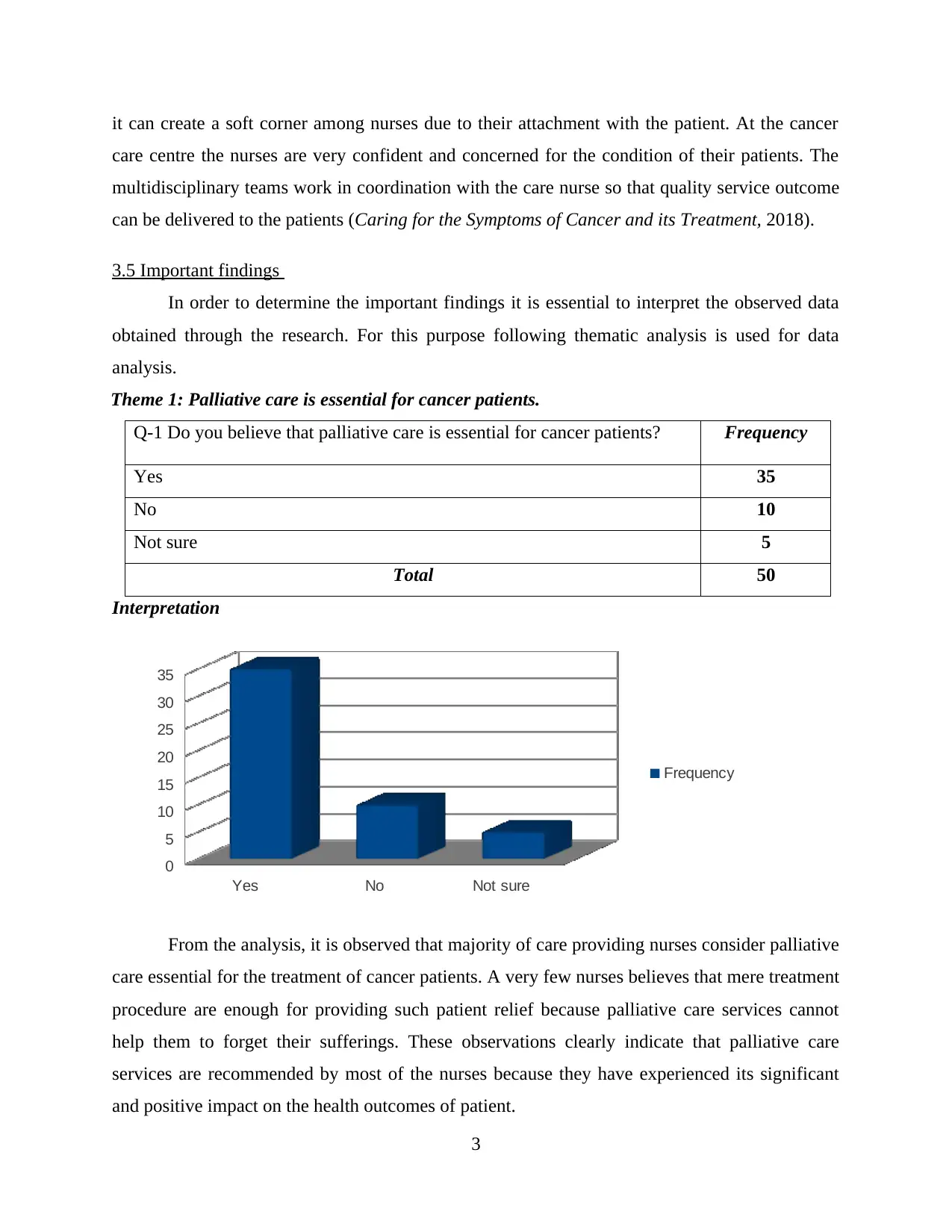
it can create a soft corner among nurses due to their attachment with the patient. At the cancer
care centre the nurses are very confident and concerned for the condition of their patients. The
multidisciplinary teams work in coordination with the care nurse so that quality service outcome
can be delivered to the patients (Caring for the Symptoms of Cancer and its Treatment, 2018).
3.5 Important findings
In order to determine the important findings it is essential to interpret the observed data
obtained through the research. For this purpose following thematic analysis is used for data
analysis.
Theme 1: Palliative care is essential for cancer patients.
Q-1 Do you believe that palliative care is essential for cancer patients? Frequency
Yes 35
No 10
Not sure 5
Total 50
Interpretation
From the analysis, it is observed that majority of care providing nurses consider palliative
care essential for the treatment of cancer patients. A very few nurses believes that mere treatment
procedure are enough for providing such patient relief because palliative care services cannot
help them to forget their sufferings. These observations clearly indicate that palliative care
services are recommended by most of the nurses because they have experienced its significant
and positive impact on the health outcomes of patient.
3
Yes No Not sure
0
5
10
15
20
25
30
35
Frequency
care centre the nurses are very confident and concerned for the condition of their patients. The
multidisciplinary teams work in coordination with the care nurse so that quality service outcome
can be delivered to the patients (Caring for the Symptoms of Cancer and its Treatment, 2018).
3.5 Important findings
In order to determine the important findings it is essential to interpret the observed data
obtained through the research. For this purpose following thematic analysis is used for data
analysis.
Theme 1: Palliative care is essential for cancer patients.
Q-1 Do you believe that palliative care is essential for cancer patients? Frequency
Yes 35
No 10
Not sure 5
Total 50
Interpretation
From the analysis, it is observed that majority of care providing nurses consider palliative
care essential for the treatment of cancer patients. A very few nurses believes that mere treatment
procedure are enough for providing such patient relief because palliative care services cannot
help them to forget their sufferings. These observations clearly indicate that palliative care
services are recommended by most of the nurses because they have experienced its significant
and positive impact on the health outcomes of patient.
3
Yes No Not sure
0
5
10
15
20
25
30
35
Frequency
Paraphrase This Document
Need a fresh take? Get an instant paraphrase of this document with our AI Paraphraser
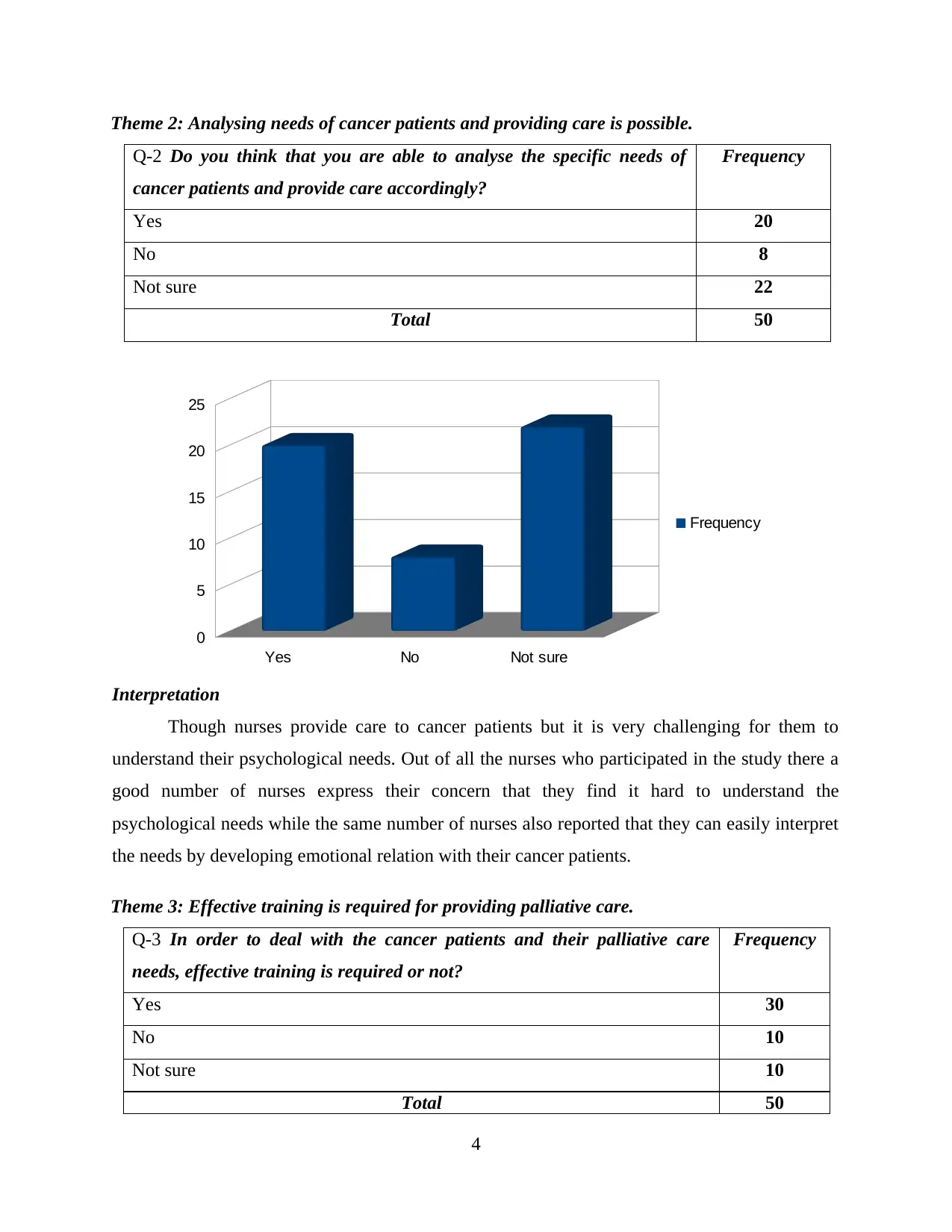
Theme 2: Analysing needs of cancer patients and providing care is possible.
Q-2 Do you think that you are able to analyse the specific needs of
cancer patients and provide care accordingly?
Frequency
Yes 20
No 8
Not sure 22
Total 50
Interpretation
Though nurses provide care to cancer patients but it is very challenging for them to
understand their psychological needs. Out of all the nurses who participated in the study there a
good number of nurses express their concern that they find it hard to understand the
psychological needs while the same number of nurses also reported that they can easily interpret
the needs by developing emotional relation with their cancer patients.
Theme 3: Effective training is required for providing palliative care.
Q-3 In order to deal with the cancer patients and their palliative care
needs, effective training is required or not?
Frequency
Yes 30
No 10
Not sure 10
Total 50
4
Yes No Not sure
0
5
10
15
20
25
Frequency
Q-2 Do you think that you are able to analyse the specific needs of
cancer patients and provide care accordingly?
Frequency
Yes 20
No 8
Not sure 22
Total 50
Interpretation
Though nurses provide care to cancer patients but it is very challenging for them to
understand their psychological needs. Out of all the nurses who participated in the study there a
good number of nurses express their concern that they find it hard to understand the
psychological needs while the same number of nurses also reported that they can easily interpret
the needs by developing emotional relation with their cancer patients.
Theme 3: Effective training is required for providing palliative care.
Q-3 In order to deal with the cancer patients and their palliative care
needs, effective training is required or not?
Frequency
Yes 30
No 10
Not sure 10
Total 50
4
Yes No Not sure
0
5
10
15
20
25
Frequency
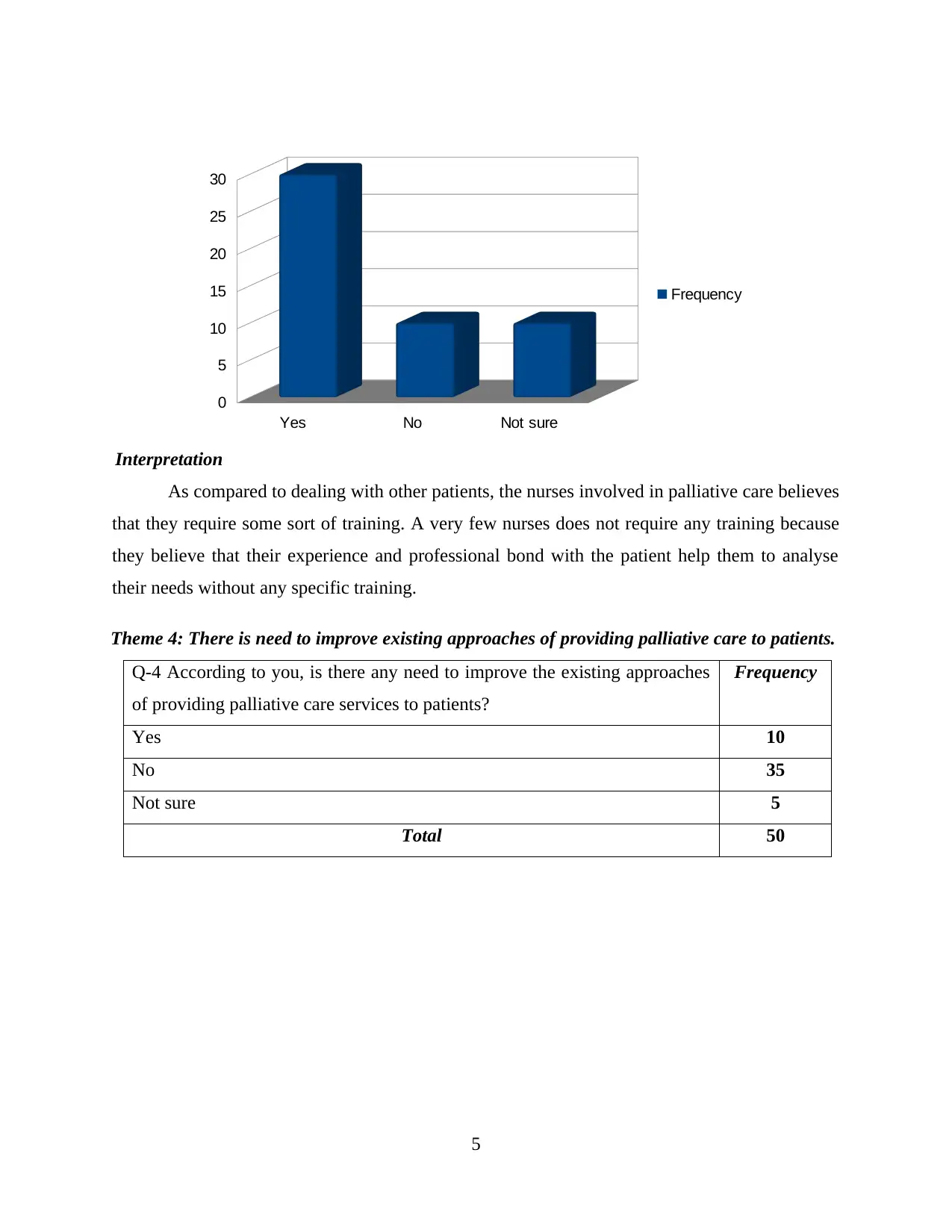
Interpretation
As compared to dealing with other patients, the nurses involved in palliative care believes
that they require some sort of training. A very few nurses does not require any training because
they believe that their experience and professional bond with the patient help them to analyse
their needs without any specific training.
Theme 4: There is need to improve existing approaches of providing palliative care to patients.
Q-4 According to you, is there any need to improve the existing approaches
of providing palliative care services to patients?
Frequency
Yes 10
No 35
Not sure 5
Total 50
5
Yes No Not sure
0
5
10
15
20
25
30
Frequency
As compared to dealing with other patients, the nurses involved in palliative care believes
that they require some sort of training. A very few nurses does not require any training because
they believe that their experience and professional bond with the patient help them to analyse
their needs without any specific training.
Theme 4: There is need to improve existing approaches of providing palliative care to patients.
Q-4 According to you, is there any need to improve the existing approaches
of providing palliative care services to patients?
Frequency
Yes 10
No 35
Not sure 5
Total 50
5
Yes No Not sure
0
5
10
15
20
25
30
Frequency
⊘ This is a preview!⊘
Do you want full access?
Subscribe today to unlock all pages.

Trusted by 1+ million students worldwide
1 out of 20
Related Documents
Your All-in-One AI-Powered Toolkit for Academic Success.
+13062052269
info@desklib.com
Available 24*7 on WhatsApp / Email
![[object Object]](/_next/static/media/star-bottom.7253800d.svg)
Unlock your academic potential
Copyright © 2020–2026 A2Z Services. All Rights Reserved. Developed and managed by ZUCOL.





